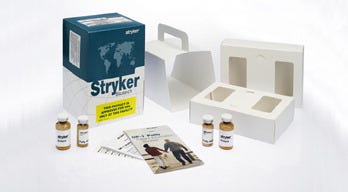Stryker Accused of Fraud and Off-Label Promotion of Bone Putty
December 7, 2015
Stryker is on the receiving end of two new product liability lawsuits related to its bone morphogenetic protein (BMP) OP-1 products, which had been approved by FDA as a "humanitarian device exemption," absolving the manufacturer from having to prove the effectiveness of the product.
Qmed Staff
Updated December 8
 Recent lawsuits filed in Middlesex County in Massachusetts accuses Stryker of fraud, negligence, and breach of warranty related to its OP-1 putty. The putty is similar the Medtronic's Infuse, which has also been targeted in liability cases.
Recent lawsuits filed in Middlesex County in Massachusetts accuses Stryker of fraud, negligence, and breach of warranty related to its OP-1 putty. The putty is similar the Medtronic's Infuse, which has also been targeted in liability cases.
The plaintiff in one of the cases, Isabel Lucas, states that after being treated with the putty for an off-label indication, she suffered permanent, disabling, and debilitating injuries. Lucas, a North Carolina resident, also maintains that the company violated the North Carolina Unfair and Deceptive Trade Practices Act. She is also asking for punitive damages.
Stryker is also facing a similar complaint in the same court, in the case Maucelli, Mary J. vs. Stryker Biotech, LLC et al.
In the past several years, Stryker has faced a string of legal problems related to its OP-1 and and Calstrux BMP products, including a 2009 federal grand jury indictment with 13 felony charges against the company. The Department of Justice agreed to toss the felony charges in lieu of a $15 million settlement and a single misdemeanor charge. A conviction on only one of the felony charges would have been potentially disastrous for its business, as it would have barred it from participating in federal healthcare programs.
The OP-1 putty, because it was approved as a "humanitarian device exemption," required permission to be granted by a review board before use only after obtaining a patient's consent. On July 10, 2009, FDA sent a "not-approvable letter" to Stryker regarding the product, which had been granted an HDE on April 27, 2004. Lucas claims that the surgeon implanted the device without her knowledge or consent.
The putty was used in an surgical procedure on July 14, 2009 at Southeastern Regional Medical Center in North Carolina to treat Lucas' chronic back pain. The complaint alleges that her surgeon implanted OP-1 "in an unapproved manner, by among other things mixing OP-1 with a synthetic bone void filler and autograft."
From the OP-1 putty labelling:
The document goes on to say that Stryker had promoted the use of OP-1 in this manner, ultimately causing her to suffer debilitating injuries. After the surgery, Lucas reported that her back pain worsened and that she was barely able to walk for a year after the procedure. She elected to have a subsequent remedial surgery and the implantation of a spinal cord stimulator to treat her pain.
The complaint states that the OP-1 putty can cause pain by triggering the formation of bone growth in undesirable areas such as over nerves.
As alluded to above, a medical device with HDE approval can only be used in a Humanitarian Use Device (HUD) designation. According to FDA policy, such a designation can be granted in limited cases, such as when the disease or condition affects fewer than 4000 people in the United States per year, or there is insufficient evidence to support the estimate. In addition, an HUD can be granted when "FDA determines that the patient population defined in the request is not a medically plausible subset of a larger population." In this specific case, the HDE was granted for "use as an alternative to autograft in compromised patients requiring revision posterolateral (intertransverse) lumbar spinal fusion, for whom autologous bone and bone marrow harvest are not feasible or are not expected to promote fusion."
In any case, a surgeon is not permitted to implant a device requiring HDE approval without the informed consent from the patient.
Lucas is represented by Baum Hedlund Aristei & Goldman, which has argued a number of lawsuits related to the OP-1 putty and Medtronic's Infuse.
Stryker denied a request for a comment, citing company policy regarding ongoing legal matters.
As the complaint was only recently filed, Stryker has not yet filed a response to the complaint, says Bijan Esfandiari, attorney at Baum Hedlund Aristei & Goldman. "I anticipate that in the coming weeks, Stryker will either file a responsive motion or an answer that may contain a general denial of all allegations as well as raise various general affirmative defenses. Stryker's specific defenses will likely not be fully fleshed out until we go through a few months of discovery," he says.
Brian Buntz is the editor-in-chief of MPMN and Qmed. Follow him on Twitter at @brian_buntz.
About the Author(s)
You May Also Like


